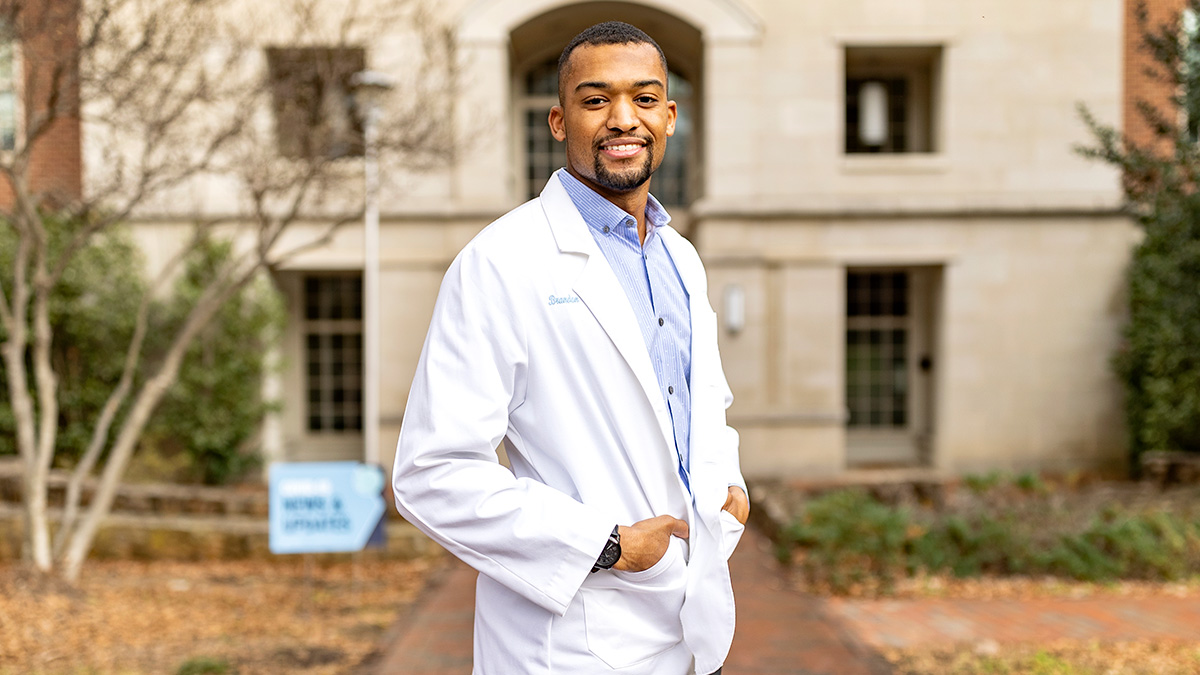Carolina alumnus Brandon Feaster arrived in Chapel Hill with his eyes set on a Ph.D. in biology for a career in the research lab. But undergrad research and the Chancellor’s Science Scholars provided the Tar Heel with the experiences and support to pursue a different career working with patients as a physiatrist.

When Brandon Feaster ’18 was deciding where to go to college, he was looking for what he considered the “quintessential college experience.” He wanted strong academics, a great athletics program to cheer on and a community dedicated to diversity.
Carolina checked off all those boxes for Feaster.
But it was the Chancellor’s Science Scholars — a merit-based scholarship program that connects UNC-Chapel Hill students pursuing STEM degrees with research opportunities, mentors and a strong support network — that turned Feaster into a Tar Heel.
“It gave me a community within the larger university of UNC, and I felt like I was included and could be around so many other like-minded, ambitious people,” Feaster said. “This was a natural landing spot for me.”
Now a fourth-year medical student at the UNC School of Medicine preparing for his medical residency, Feaster says the Chancellor’s Science Scholars helped provide the undergraduate experience he was looking for while also building the foundation for a career as a doctor.
The goal of becoming a medical doctor wasn’t initially his plan when he arrived in Chapel Hill as a first-year student. Feaster had been involved in research as a high schooler in Winston-Salem, North Carolina, and he was looking to ultimately earn a Ph.D. in biology and work in a lab.
When the Chancellor’s Science Scholars connected Feaster, a biology major, with undergraduate research work at the UNC Eshelman School of Pharmacy, he began thinking about a different career track. In the lab, he assisted in cancer research that could help chemotherapy drugs become more effective.
“Once in the lab, I was immersed in work that involved several health disparities,” he said. “When you’re analyzing the data, you are able to see how patients are affected differently and how science can impact change. While this was rewarding, the experience showcased that I wanted to be patient-facing in my career moving forward.
“It was really awesome, really groundbreaking work that I was happy to be a part of. Even though I’m not planning a career solely in research, it has influenced all parts of my clinical practice and will make me a better physician-scientist.”
These experiences led Feaster all the way to his residency interviews for medical school this month. He plans to become a physiatrist, specializing in physical medicine and rehabilitation, and his hands-on research as an undergraduate strengthened his skills as a future doctor.
While the research opportunities he found through the Chancellor’s Science Scholars helped Feaster find his path, the program’s framework of mentorship and community helped him thrive at Carolina to make that career a reality.
“It was a central background to my entire college experience,” Feaster said, reflecting on his four years in the program. “When awarded the scholarship, I don’t think I even comprehended how useful it would be. I remember my first day of classes freshmen year, and I was in a chemistry class with at least six other people from CSS. We all knew we were going to have each other’s backs. We could study together and help each other out.
“As you progress to upper-level classes and everyone’s professional interests begin to diverge, you still have the CSS support system.”
That network, Feaster said, has continued even after his cohort graduated in 2018. The former scholars still reach out to each other for professional and personal support.
He is also still involved in the program as an alumnus, contributing to workshops, mentoring scholars interested in medical school and interviewing new applicants.
By giving back to the community alongside his fellow Chancellor’s Science Scholars alumni, Feaster hopes to build exponential progress in creating a more diverse STEM.
“We are surrounded by one another. We understand what it’s like to help one another and work in a team environment,” Feaster said. “We have to pay it forward for future generations. That is how we impact and increase diversity in science.
